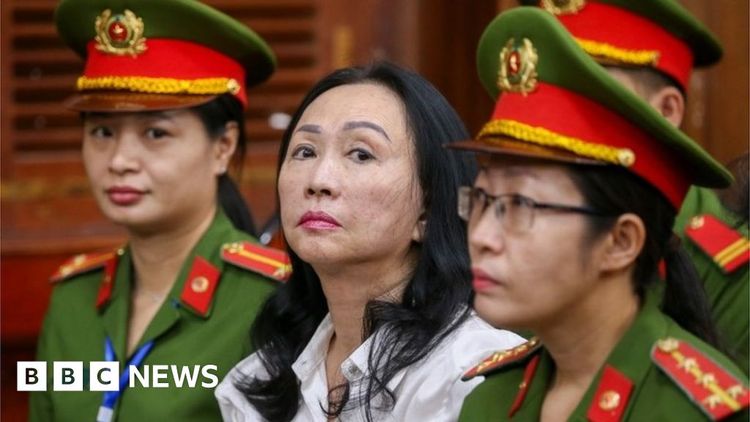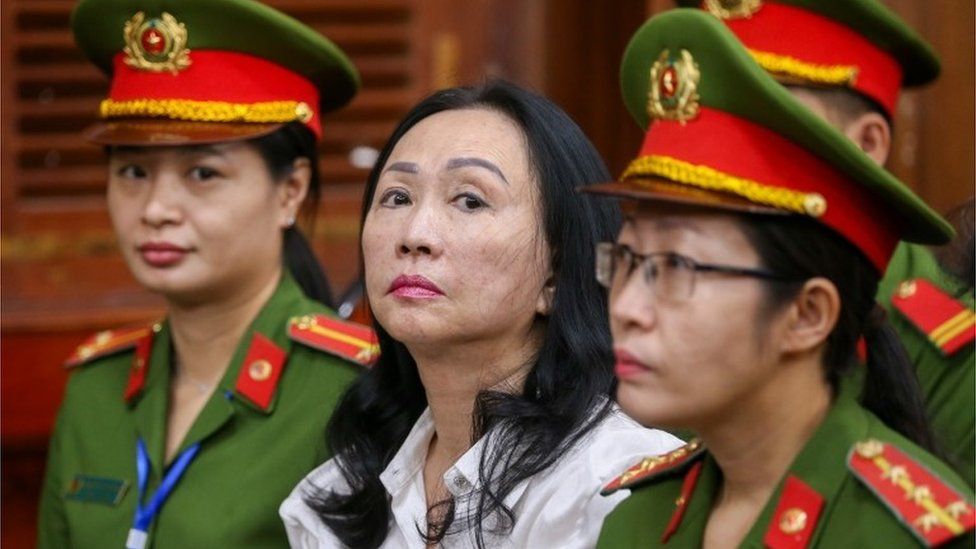Truong My Lan: Vietnamese billionaire sentenced to death for $44bn fraud

Truong My Lan is being alleged of stealing from one of Vietnam's biggest banks for 11 years straight.

Jonathan Head and Thu Bui wrote about a certain topic in a blog section.
The trial that took place in Vietnam was incredibly remarkable and matched the enormity of one of the biggest bank scams that has occurred globally.
At the historical courthouse in Ho Chi Minh City, which has a grand yellow entrance, a 67-year-old property developer from Vietnam has been handed a death sentence for stealing from one of the biggest banks in the country for a total of 11 years.
It's an uncommon decision - she belongs to a small number of females in Vietnam who have received the death penalty for a non-violent crime.
The judgment is a result of the extensive wrongdoing that occurred. Truong My Lan had been found guilty of acquiring $44 billion (£35 billion) loan from the Saigon Commercial Bank. The ruling necessitates her to repay $27 billion, which the prosecutors acknowledge might not be collected. A few individuals think that the court is hoping to motivate her to restore some of the lost billions by imposing the death penalty.
The communist authorities, who usually keep things hidden, were surprisingly open about this case and gave a lot of information to the media. They mentioned that around 2,700 individuals were called to provide testimony, and that the case involved about 10 state prosecutors and around 200 lawyers.
There were 104 boxes of evidence, which weighed six tonnes. Truong My Lan was one of the 85 defendants on trial and she claimed that the charges were false.
David Brown, a former US state department official who has extensive knowledge of Vietnam, believes that this show trial is unlike any that occurred during the communist era. In his opinion, there has never been anything of this magnitude before.
The Communist Party Secretary-General, Nguyen Phu Trong, has been spearheading the "Blazing Furnaces" campaign to combat corruption. The trial marked the most significant episode of the campaign, and it was very intense.
Nguyen Phu Trong, a person who strongly believes in conservative ideologies based on Marxist theory, thinks that uncontrolled corruption-related frustration amongst the public is a major challenge for the Communist Party's exclusive hold of power. In 2016, he started campaigning seriously after tactfully defeating the previous pro-business prime minister to preserve his position as the party's leader.
The source of the image used in this blog post can be credited to Getty Images.
The head of the Communist Party, Nguyen Phu Trong, is spearheading an effort to combat corruption.
The movement has resulted in the resignation of two presidents and two deputy prime ministers, along with the disciplining or sentencing of numerous officials. Currently, one of the wealthiest women in the country has recently joined this group.
Truong My Lan is originally from Ho Chi Minh City, which was previously known as Saigon. Her family has a Sino-Vietnamese background. The city has played a crucial role in Vietnam's economy and has been a major commercial hub, even during its time as the former capital of South Vietnam, which opposed communism. Additionally, there is a significant ethnic Chinese population in the city.
Initially, she commenced her business journey as a seller at a market stall where she sold cosmetics jointly with her mother. However, following the arrival of the Communist Party and their initiation of economic change, referred to as Doi Moi, in 1986, she shifted towards purchasing land and properties. As the 1990s progressed, she had already amassed a significant collection of hotels and restaurants.
Even though Vietnam is mostly recognized internationally for its rapidly expanding manufacturing industry, which serves as a substitute supply chain to China, affluent Vietnamese individuals gained their wealth through property development and speculation.
The government now legally owns all land. The ability to use it often depends on having personal connections with government officials. As the economy expanded, corruption increased and became widespread.
In 2011, Truong My Lan was a renowned business figure in Ho Chi Minh City who had the privilege of organizing the consolidation of three financially struggling banks into a bigger institution referred to as Saigon Commercial Bank.
According to Vietnamese legislation, it is not permissible for a person to possess over 5% of shares in a bank. However, prosecutors have raised concerns that Truong My Lan had control of over 90% of Saigon Commercial Bank through several shell businesses and by utilizing others to act on her behalf.
The allegations against her suggest that she utilized her authority to hire her own associates as managers, and subsequently instructed them to authorize a vast number of loans to the chain of fictitious enterprises that were under her supervision.
The sums withdrawn are astonishing. Her borrowings represented 93% of the entire bank's loaning.
As stated by legal authorities, for a duration of three years starting from February 2019, she instructed her chauffeur to take out 108 trillion Vietnamese dong, which is equivalent to over $4 billion (£2.3 billion) in physical money from the bank and stash it in her cellar.
That amount of money, even if entirely composed of the biggest banknotes in Vietnam, would weigh two tons.
She was also alleged to have given large sums of money as bribes to make sure her loans were never investigated. Someone who previously held the position of head inspector at the main bank was put on trial and faced accusations of taking a bribe worth $5 million.
A lot of publicity was released by the authorities regarding the case, which made the public very angry about Truong My Lan's corruption. She appeared tired and without makeup during her court appearance, which was a complete contrast to the glamorous images of her that had been previously seen.
People are also wondering how she was able to continue committing the supposed deceitful act for an extended period.
The photo credit goes to Getty Images.
The legal proceedings were held in Ho Chi Minh City, which served as the location for Saigon Commercial Bank.
Le Hong Hiep, the manager of the Vietnam Studies Programme at the ISEAS - Yusof Ishak Institute in Singapore, expresses his confusion.
It was common knowledge in the market that Truong My Lan and her group, Van Thinh Phat, were using SCB as a means to finance their extensive purchasing of top-rated properties. There was no secrecy involved in this matter.
It was clear that she needed to acquire the funds from somewhere. However, it is a widespread occurrence. SCB is not the only financial institution that participates in this behavior. As a result, it's plausible that the administration overlooked the situation because there are numerous comparable scenarios in the industry.
David Brown thinks that she had influential people shielding her who have been controlling the business and political sectors in Ho Chi Minh City for a long time. Additionally, he believes that there is a larger motive behind the management of this trial - an attempt to reaffirm the Communist Party's supremacy over the unrestricted business environment in the southern region.
Nguyen Phu Trong and his cohorts in the party are attempting to recapture power over Saigon, or at minimum prevent it from slipping out of their grasp.
Prior to 2016, the group of Chinese-Vietnamese gangsters held significant control in Hanoi without interference from the local government. While the communist leaders publicly displayed their support, in reality, they were benefiting from the profits generated by the gang.
The leader of the party, Nguyen Phu Trong, is currently 79 years old and his health condition is not stable. It is highly likely that he will step down from his position during the upcoming Communist Party Congress in 2026, during which fresh leaders will be appointed.
He has served as secretary-general for a long time and has had a great impact by bringing back the power of the conservative faction of the party to a level that hadn't been seen since the reforms of the 1980s. It is evident that he doesn't want to take the chance of allowing too much openness, which could potentially weaken the party's grasp on political control.
However, he finds himself facing a paradox. Although he aims to lead the party towards achieving a high-income country status by 2045, through an economy based on technology and knowledge, he is surrounded by opposing forces. To achieve this goal, he strengthens the cooperation and alliance with the United States.
As Vietnam experiences rapid economic growth, it's likely that there will be an increase in corrupt practices. However, aggressively combating corruption could result in a decrease in economic activity. Currently, there are concerns that bureaucracy has become sluggish due to officials being reluctant to make decisions that could potentially involve them in a corruption scandal.
Le Hong Hiep points out the paradoxical situation in their growth model. Corrupt practices have been essential to keep the machinery working. However, if they decide to eliminate corruption, they might encounter undesirable consequences.











































